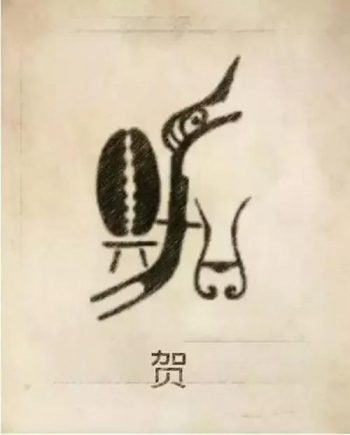With roots stretching back to the Spring and Autumn Period (771–476 BCE), the He(hè) surname embodies China's rich blend of cultural traditions and ethnic fusion. Today, over 2.2 million people bear this surname worldwide. Let's unravel its fascinating story!

Ⅰ、 Origin of the surname He:
1. From Qi to He:
The core origin of the He surname is closely related to the descendants of Duke Huan of Qi. His descendant, Lord Qing Feng, was granted the territory of "He" (modern Shandong). Initially called "Qing(qìng)" the family changed to "He(hè)" during the Eastern Han Dynasty (25–220 CE) to avoid naming taboos for Emperor Han An's father, Liu Qing. The shift from "Qing" to "He" preserved their legacy while honoring imperial etiquette.
2. Royal Refugees:
Another branch originated from Prince Qing Ji of the Wu Kingdom. After political turmoil, his descendants fled to Kuaiji (Zhejiang) and adopted "He" during the same Han naming reforms.
3. Ethnic Fusion:
During the Northern Wei Dynasty (386–534 CE), nomadic Xianbei tribes like Helan and Helai adopted "He" under Emperor Xiaowen's assimilation policies, blending steppe traditions with Han customs.
4. Merit-Based Honors
Between 535–581 CE, outstanding officials in Western Wei and Northern Zhou were granted the He surname as a royal reward, showcasing China's meritocratic traditions.
Ⅱ、Historical celebrities
1. Ancient Icons
He Xun (260–319 CE): Known as the "Confucian Sage of Jiangnan," he reformed ritual systems that shaped Southern Dynasty culture.
He Ruobi (544–607 CE): A Sui Dynasty general of Xianbei descent, famed for conquering the Chen Kingdom and unifying China.
He Zhizhang (659–744 CE): Tang Dynasty poet-statesman whose works like Returning Home are still memorized by Chinese students. A close friend of Li Bai, he epitomized the scholar-official ideal.
2. Modern Trailblazers
He Long (1896–1969): Military leader in China's 20th-century revolutions, later serving as Vice Premier.
He Jingzhi (1924– ): Co-author of the revolutionary opera The White-Haired Girl, a milestone in modern Chinese theater.
He Fu Chu (1962– ): Pioneer in proteomics research, elected to the Chinese Academy of Sciences in 2005.
Ⅲ、Cultural significance:
1. Symbols & Mottos
Siming Hall: Named after He Zhizhang's retirement home in Zhejiang mountains, symbolizing scholarly retreat.
2. Confucian Ancestry Hall:
Honors He Xun's contributions to ethical governance.
3. Family Motto:
"Master poetry to cultivate wisdom; uphold integrity to refine character" (from Jiaxing He Clan records).
Ⅳ、Social impact
1. Migration Patterns
Ancient Era: Concentrated in Shandong and Zhejiang.
Medieval Period: Spread to Hunan and Shanxi via trade routes.
Modern Diaspora: 23% of Hes reside in Hunan Province, with growing communities in Silicon Valley and New York Chinatowns.
2. Artistic Legacy:
He Zhizhang's poetry and He Youzhi's Great Changes in a Mountain Village comics remain cultural touchstones.
3. Global Connections:
From biotech labs to Chinatown associations, Hes bridge China's past with worldwide innovation.
Conclusion:
The He surname mirrors China's ability to reinvent itself while preserving identity. Whether through a Tang poet's verses or a scientist's breakthroughs, this surname is not only a symbol of blood, but also a vivid interpretation of the pluralistic and integrated pattern of Chinese culture.